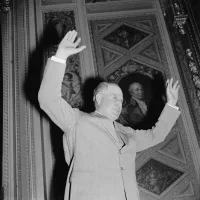Gary Peters is a U.S. Senator from Michigan, serving since 2015. A Democrat, he previously represented Michigan's 14th congressional district from 2009 to 2015. His district included the eastern half of Detroit, the Grosse Pointes, Hamtramck, Southfield, and Pontiac. Before his political career, Peters was a lawyer and military officer.
1933: District Creation
The congressional district was created in 1933.
1950: Closest Statewide Contest Since 1950 Gubernatorial Race
The 2002 Attorney General race was Michigan's closest statewide contest since the 1950 gubernatorial race.
1953: District Number Change
From 1953, the district was known as the 18th district.
December 1, 1958: Gary Peters Born
On December 1, 1958, Gary Charles Peters was born. He is an American lawyer, politician, and former military officer.
1973: District Number Change
From 1973, the district was known as the 19th district.
1980: Assistant Vice President at Merrill Lynch
From 1980, Gary Peters worked as an assistant vice president at Merrill Lynch.
1980: Graduated from Alma College
In 1980, Gary Peters graduated magna cum laude from Alma College with a Bachelor of Arts degree in political science.
1983: District Number Change
From 1983, the district was known as the 18th district.
1984: Earned MBA from University of Detroit
In 1984, Gary Peters earned a Master of Business Administration from the University of Detroit.
1989: Joined Paine Webber as Vice President
In 1989, Gary Peters joined Paine Webber as a vice president.
1990: Failed attempt to be elected
In 1990, Gary Peters had a failed attempt to be elected to the Michigan Senate.
1991: Served on the Rochester Hills City Council
From 1991, Gary Peters served on the Rochester Hills City Council.
1993: First White Congressman to Represent Significant Portion of Detroit Since 1993
After winning election, Peters was the first white congressman to represent a significant portion of Detroit since 1993.
1993: District Number Change
From 1993, the district was known as the 11th district.
1993: Served on the Rochester Hills City Council
In 1993, Gary Peters served on the Rochester Hills City Council.
1993: Joined United States Navy Reserve
In 1993, at age 34, Gary Peters joined the United States Navy Reserve.
November 1994: Elected to Michigan Senate
In November 1994, Gary Peters was elected to the Michigan Senate to represent the 14th district.
1995: Represented 14th district in Michigan Senate
From 1995, Gary Peters represented the 14th district in the Michigan Senate.
1998: Performance in 1998 state Senate campaign
In his 1998 state Senate campaign, Gary Peters performed at or above base in 99% of the precincts.
2002: Lost election for Attorney General
In 2002, Gary Peters lost the election for Attorney General to Mike Cox by about 5,200 votes.
2002: Stepped down as a Michigan Senator
In 2002, Gary Peters stepped down as a Michigan Senator due to state's term limits.
2002: Candidate for governor and Attorney General
In 2002, Gary Peters was a candidate for governor and later for Attorney General.
2002: Democratic nominee for Michigan Attorney General
In 2002, Gary Peters was the Democratic nominee for Michigan Attorney General, but narrowly lost to Mike Cox.
2002: Performance in 2002 state attorney general race
In the 2002 state attorney general race, Gary Peters performed at or above the Democratic base in 72% of the 9th district precincts.
2002: Opponents Performed Significantly Below Democratic Base
Joe Knollenberg's opponents in 2002 had performed significantly below the Democratic base in the district.
2003: Commissioner of the Michigan Lottery
In 2003, Gary Peters was appointed commissioner of the Michigan Lottery by Governor Jennifer Granholm.
2003: Appointed as Michigan Lottery commissioner
In 2003, Governor Jennifer Granholm appointed Gary Peters as the Michigan Lottery commissioner.
2003: District Number Change
In 2003, the district became the 9th.
2004: Opponents Performed Significantly Below Democratic Base
Joe Knollenberg's opponents in 2004 had performed significantly below the Democratic base in the district.
2006: Nearly defeated by Nancy Skinner
In 2006, Joe Knollenberg was nearly defeated by Nancy Skinner, a former radio talk-show host who spent virtually no money.
August 7, 2007: Announced run against Joe Knollenberg
On August 7, 2007, Gary Peters announced he would run against Joe Knollenberg in the 9th district and resigned as state lottery commissioner.
2007: Griffin Endowed Chair in American Government at CMU
From 2007, Gary Peters served as the third Griffin Endowed Chair in American Government at Central Michigan University.
2008: Left the Navy Reserve
Gary Peters left the Reserve in 2008, attaining the rank of lieutenant commander.
2008: Served as the third Griffin Endowed Chair
In 2008, Gary Peters served as the third Griffin Endowed Chair in American Government at Central Michigan University.
January 2009: Sworn into first term
In January 2009, Gary Peters was sworn into his first term in office.
2009: U.S. Representative for Michigan's 14th congressional district
In 2009, Gary Peters became the U.S. representative for Michigan's 14th congressional district.
November 2010: Defeated multiple challengers
In November 2010, Gary Peters defeated challenges by Republican Andrew "Rocky" Raczkowski, Libertarian Adam Goodman, Independent Bob Gray, Independent Matthew Kuofie, and Green Douglas Campbell.
2010: Michigan lost a congressional district
Due to the state's population decline, as reflected by the 2010 census, Michigan lost one congressional district.
2010: Criticizing the Leadership of His Own Party
In 2010, Gary Peters criticized the leadership of his own party and formed the Spending Cuts and Deficit Reduction Working Group.
September 2011: Opted to Run in the Newly Redrawn 14th District
In September 2011, Gary Peters opted to run in the newly redrawn 14th district after redistricting.
November 2011: Allied with Occupy Wall Street movement
In November 2011, Gary Peters allied himself with the Occupy Wall Street movement and made an appearance at Occupy Detroit.
2011: Signed Letter to President Obama Supporting UNFPA
In 2011, Gary Peters was one of 118 House Democrats who signed a letter to President Obama urging him to support the United Nations Population Fund (UNFPA).
August 2012: Defeated Clarke and Lawrence in Democratic Primary
In August 2012, Gary Peters defeated Hansen Clarke and Brenda Lawrence in the Democratic primary for the 14th district.
2013: Named Senior Whip for Democratic Caucus
In 2013, Gary Peters was named senior whip for the Democratic caucus.
2013: District changed from 9th to 14th
In 2013, Gary Peters' district was changed from Michigan's 9th congressional district to Michigan's 14th congressional district.
July 2014: Elizabeth Warren Supported Peters
In July 2014, Senator Elizabeth Warren supported Gary Peters at a campaign fundraising event.
2014: Opposed Michigan Law Prohibiting Abortion Coverage
In 2014, Gary Peters opposed a Michigan law that prohibits insurers from offering abortion coverage as a standard feature in health plans.
2014: Ran for Senate Seat
In 2014, Gary Peters ran for the Senate seat being vacated by retiring Senator Carl Levin.
2014: Elected to United States Senate
In 2014, Gary Peters was elected to the United States Senate, succeeding Carl Levin. He defeated Terri Lynn Land in the general election.
2015: Became U.S. Senator from Michigan
In 2015, Gary Peters became the senior United States senator from Michigan, a seat he has held since then.
2015: Voted for the International Violence Against Women Act
In 2015, Gary Peters voted for the International Violence Against Women Act.
2016: Supported Chris Murphy gun control filibuster
In 2016, after the Orlando nightclub shooting, Gary Peters supported the Chris Murphy gun control filibuster.
2017: Cosponsored Bill on Foreign Investment
In 2017, Gary Peters cosponsored a bill to broaden the federal government's ability to prevent foreign purchases of U.S. firms by strengthening the Committee on Foreign Investment in the United States (CFIUS).
2017: Cosponsored Israel Anti-Boycott Act
In 2017, Gary Peters cosponsored the Israel Anti-Boycott Act, which would make it a federal crime to encourage or participate in boycotts against Israel and Israeli settlements.
2018: Received diploma from the College of Naval Command and Staff
In 2018, Gary Peters received a diploma from the College of Naval Command and Staff, part of the U.S. Naval War College.
2019: Introduced Background Check Expansion Act
In 2019, Gary Peters was one of 40 senators to introduce the Background Check Expansion Act, a bill that would require background checks for the sale or transfer of all firearms.
November 2020: Re-election to the Senate
In November 2020, Gary Peters faced Republican nominee John E. James in the general election and was re-elected to the Senate by a smaller than expected margin of 1.7%.
2020: Reelected to Senate
In 2020, Gary Peters was reelected to the Senate, defeating John E. James in a close race.
January 6, 2021: Capitol Attack and Response
On January 6, 2021, while participating in the certification of the 2021 United States Electoral College vote count, Gary Peters was evacuated from the Senate floor due to the attack on the United States Capitol by Trump supporters. He condemned the attacks, blamed Trump, and called for investigations into the security failure.
January 28, 2021: Chair of Democratic Senatorial Campaign Committee
On January 28, 2021, Gary Peters was selected as chair of the Democratic Senatorial Campaign Committee for the 2022 election cycle.
2021: Voted against COVID-19 pandemic financial support to undocumented immigrants
In 2021, Gary Peters voted against providing COVID-19 pandemic financial support to undocumented immigrants.
2022: Chair of Democratic Senatorial Campaign Committee
In 2022, Gary Peters was the chair of the Democratic Senatorial Campaign Committee.
2023: Ranked Second for Bipartisanship
In 2023, The Lugar Center ranked Gary Peters second among senators for bipartisanship.
2024: Selected again for 2024 election cycle
Gary Peters was selected again for the 2024 election cycle to be the chair of the Democratic Senatorial Campaign Committee.
January 2025: Senior U.S. Senator
In January 2025, Gary Peters succeeded Debbie Stabenow as the state's senior U.S. senator.
January 28, 2025: Announcement of Not Seeking Reelection
On January 28, 2025, Gary Peters announced that he will not seek reelection in 2026.
March 5, 2025: Introduced Expanding Whistleblower Protections for Contractors Act of 2025
On March 5, 2025, Gary Peters introduced S. 874, the Expanding Whistleblower Protections for Contractors Act of 2025, which aims to strengthen protections for federal contractors who report waste, fraud, or abuse.
2025: Voted for the Laken Riley Act
In 2025, Gary Peters was one of 12 Senate Democrats who joined all Republicans to vote for the Laken Riley Act.
2026: Not seeking re-election in 2026
Gary Peters will not seek re-election in 2026.
Mentioned in this timeline

Elizabeth Warren is a prominent American politician and the senior...
The Affordable Care Act ACA also known as Obamacare is...

George Washington a pivotal Founding Father served as the first...

A filibuster is a tactic used in legislative bodies where...

Chris Murphy is the junior United States Senator from Connecticut...

Jennifer Mulhern Granholm is a prominent figure in American politics...
Trending

14 minutes ago Cavaliers defeat Hornets 118-113: Game recap and key takeaways from the match.
14 minutes ago Vaccination Requirements and Measles Prevention in Cabo San Lucas and La Paz
15 minutes ago Cason Wallace Secures Four Steals in Thunder's Victory: A Promising NBA Performance.
1 day ago Roman Anthony expected as Red Sox leadoff hitter in 2026, lineup prediction

15 minutes ago Isaiah Hartenstein showcases passing skills, removed from injury report, fills stat sheet.
15 minutes ago Sadie Sink and Noah Jupe Star in Romeo & Juliet West End Production.
Popular

Jesse Jackson is an American civil rights activist politician and...

Barack Obama the th U S President - was the...

Bernie Sanders is a prominent American politician currently serving as...

Michael Joseph Jackson the King of Pop was a highly...

Ken Paxton is an American politician and lawyer serving as...
WWE Raw a professional wrestling television program by WWE airs...
